German film actor Carl Auen (1892–1972) often appeared in silent films as the handsome gentleman, officer, or nobleman. Between 1914 and 1938 he appeared in 119 films.
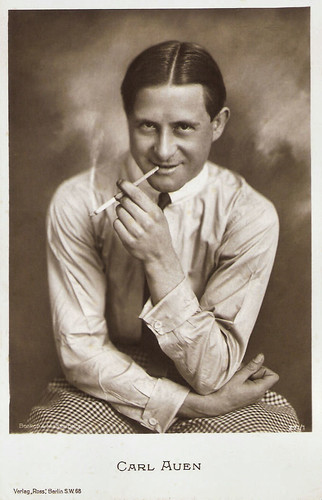
German postcard by Ross Verlag, no. 271/1, 1919-1924. Photo: Becker & Maas, Berlin.
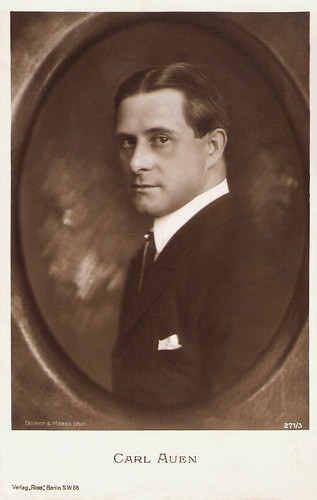
German postcard by Ross Verlag, no. 271/3, 1919-1924. Photo: Becker & Maass, Berlin.

German postcard by Verlag Hermann Leiser, Berlin, no. 3282. Photo: Greenbaum-Film. Lori Leux and Carl Auen in Das Tagebuch des Apothekers Warren/The Diary of the Pharmacist Warren (Karl Schneider, 1918).
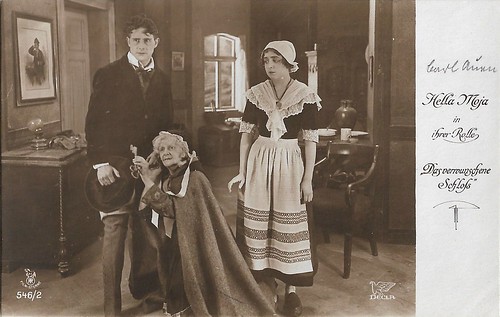
German postcard by Rotophot in the Film-Sterne series, no. 546/2. Photo: Decla. On the right, Hella Moja as Veronika, Carl Auen as Gontard, and Lina Paulsen as Ursula in Das verwunschene Schloß (Otto Rippert, 1918).

Italian postcard by Ed. G. Vettori, Bologna, no. 342. Photo: Nero-Film. Asta Nielsen and Carl Auen in Das Haus am Meer (Fritz Kaufmann, 1924).
Carl Theodor Auen was born in Düsseldorf, Germany in 1892.
In 1914 he appeared in the short silent film Die geheimnisvolle Villa/The secret villa, directed by Joe May and written by Ernst Reicher. It was a crime film that featured Ernst Reicher as the detective Stuart Webbs. In the cast were also Werner Krauss, Max Landa, Mia May, and her daughter Eva May, who all would become well known silent film stars.
Auen often worked with such directors as Franz Hofer, William Kahn, Leo Lasko, and Wolfgang Neff.
He was successful with two film series, one in which he played the criminologist Rat Anheim (1917-1918) and in the other he was the detective Joe Deebs (1919-1920), replacing Max Landa.
The highlight of his career was in the 1920s, when he starred in successful films as Frauenschicksal/Women's destiny (Guido Schamberg, 1922) with Marcella Albani, Lyda Ssanin (Friedrich Zelnik, 1923) featuring Lyda Mara, Aschermittwoch/Ash Wednesday (Wolfgang Neff, 1925) and Einer gegen Alle/One against all (Nunzio Malasomma, 1927) with Carlo Aldini.
In 1927, Auen also had a supporting part in the German silent film Der falsche Prinz/The False Prince (Heinz Paul, 1927) starring Harry Domela. The film was based on Domela's own book recounting his adventures in post-First World War Germany when he briefly masqueraded as Prince.
Two years later Auen appeared as a defender in the drama Meineid/Perjury (Georg Jacoby, 1929) starring Alice Roberts, Franz Lederer, and Miles Mander.
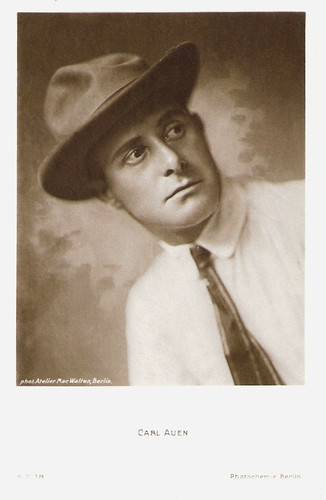
German postcard by Photochemie, Berlin, no. K. 2218. Photo: Atelier Mac Walten, Berlin.

German postcard by Photochemie, Berlin, no. K. 2722. Photo: Mac Walten, Berlin.
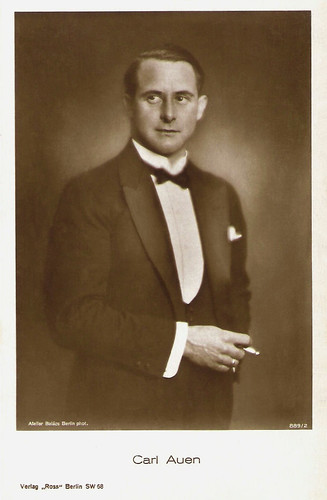
German postcard by Ross Verlag, no. 889/2, 1925-1926. Photo: Balázs, Berlin.
After 107 silent films, Carl Auen continued his career during the sound era. The now 40-years old Auen only played supporting roles.
He had a small part in the Swiss-German war film Tannenberg (Heinz Paul, 1932), based around the 1914 Battle of Tannenberg during the First World War.
That year he also appeared in the comedy thriller Es geht um alles/All is at Stake (Max Nosseck, 1932) starring Luciano Albertini.
It was followed by the film operetta Die Blume von Hawaii/The Flower of Hawaii (Richard Oswald, 1933), an adaptation of the operetta The Flower of Hawaii by Paul Abraham starring Márta Eggerth.
Before Hitler came to power, Auen had joined the anti-semitic Kampfbund für deutsche Kultur (KfdK) and the Betriebszellen-Organisation (National Socialist Factory Cell Organization), a workers organization in Nazi Germany.
Joseph Goebbels appointed him in 1933 to head the film student council of the Reichsfilmkammer (Film Chamber of the Reich), a key position in the personnel policy within the Nazi film industry.
In 1937 Auen played a police officer in the propaganda film Togger (Jürgen von Alten, 1937) and he had a small part in Richard Eichberg's two-part adventure film Der Tiger von Eschnapur/The Tiger of Eschnapur (Richard Eichberg, 1938) and Das indische Grabmal/The Indian Tomb (Richard Eichberg, 1938) starring La Jana and Frits van Dongen.
His last film role was in the crime film Mit versiegelter Order/With sealed orders (Karl Anton, 1938) with Viktor de Kowa.
After World War II he worked as a representative for liquor. Completely forgotten, Carl Auen died in 1972 in Berlin. He was 80.

German postcard by Ross Verlag, Berlin, no. 271/2, 1919-1924. Photo: Becker & Maass.

German postcard by Ross Verlag, Berlin, no. 899/1, 1925-1926. Photo: Atelier Balazs, Berlin.

German postcard by Ross Verlag, Berlin, no. 1106/2, 1927-1928. Photo: Nicola Perscheid, Berlin.

German postcard by Ross Verlag, Berlin, no. 1897/2, 1927-1928. Photo: Hanni Schwarz, Berlin.
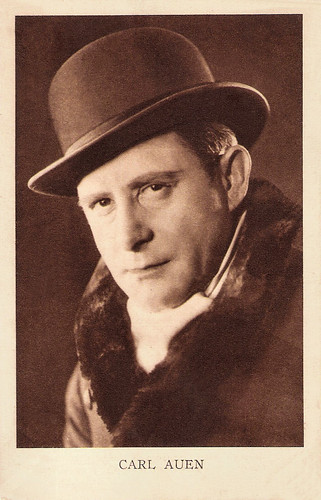
Belgian postcard by Edition S.A. Cacao et Chocolat Kivou, Vilvoorde.
Sources: Stephanie D’heil (Steffi-Line - German), Thomas Staedeli (Cyranos), Filmportal.de, Wikipedia (English and German), and IMDb.
This post was last updated on 1 February 2021.

German postcard by Ross Verlag, no. 271/1, 1919-1924. Photo: Becker & Maas, Berlin.

German postcard by Ross Verlag, no. 271/3, 1919-1924. Photo: Becker & Maass, Berlin.

German postcard by Verlag Hermann Leiser, Berlin, no. 3282. Photo: Greenbaum-Film. Lori Leux and Carl Auen in Das Tagebuch des Apothekers Warren/The Diary of the Pharmacist Warren (Karl Schneider, 1918).

German postcard by Rotophot in the Film-Sterne series, no. 546/2. Photo: Decla. On the right, Hella Moja as Veronika, Carl Auen as Gontard, and Lina Paulsen as Ursula in Das verwunschene Schloß (Otto Rippert, 1918).

Italian postcard by Ed. G. Vettori, Bologna, no. 342. Photo: Nero-Film. Asta Nielsen and Carl Auen in Das Haus am Meer (Fritz Kaufmann, 1924).
Detective Joe Deebs
Carl Theodor Auen was born in Düsseldorf, Germany in 1892.
In 1914 he appeared in the short silent film Die geheimnisvolle Villa/The secret villa, directed by Joe May and written by Ernst Reicher. It was a crime film that featured Ernst Reicher as the detective Stuart Webbs. In the cast were also Werner Krauss, Max Landa, Mia May, and her daughter Eva May, who all would become well known silent film stars.
Auen often worked with such directors as Franz Hofer, William Kahn, Leo Lasko, and Wolfgang Neff.
He was successful with two film series, one in which he played the criminologist Rat Anheim (1917-1918) and in the other he was the detective Joe Deebs (1919-1920), replacing Max Landa.
The highlight of his career was in the 1920s, when he starred in successful films as Frauenschicksal/Women's destiny (Guido Schamberg, 1922) with Marcella Albani, Lyda Ssanin (Friedrich Zelnik, 1923) featuring Lyda Mara, Aschermittwoch/Ash Wednesday (Wolfgang Neff, 1925) and Einer gegen Alle/One against all (Nunzio Malasomma, 1927) with Carlo Aldini.
In 1927, Auen also had a supporting part in the German silent film Der falsche Prinz/The False Prince (Heinz Paul, 1927) starring Harry Domela. The film was based on Domela's own book recounting his adventures in post-First World War Germany when he briefly masqueraded as Prince.
Two years later Auen appeared as a defender in the drama Meineid/Perjury (Georg Jacoby, 1929) starring Alice Roberts, Franz Lederer, and Miles Mander.

German postcard by Photochemie, Berlin, no. K. 2218. Photo: Atelier Mac Walten, Berlin.

German postcard by Photochemie, Berlin, no. K. 2722. Photo: Mac Walten, Berlin.

German postcard by Ross Verlag, no. 889/2, 1925-1926. Photo: Balázs, Berlin.
Reichsfilmkammer
After 107 silent films, Carl Auen continued his career during the sound era. The now 40-years old Auen only played supporting roles.
He had a small part in the Swiss-German war film Tannenberg (Heinz Paul, 1932), based around the 1914 Battle of Tannenberg during the First World War.
That year he also appeared in the comedy thriller Es geht um alles/All is at Stake (Max Nosseck, 1932) starring Luciano Albertini.
It was followed by the film operetta Die Blume von Hawaii/The Flower of Hawaii (Richard Oswald, 1933), an adaptation of the operetta The Flower of Hawaii by Paul Abraham starring Márta Eggerth.
Before Hitler came to power, Auen had joined the anti-semitic Kampfbund für deutsche Kultur (KfdK) and the Betriebszellen-Organisation (National Socialist Factory Cell Organization), a workers organization in Nazi Germany.
Joseph Goebbels appointed him in 1933 to head the film student council of the Reichsfilmkammer (Film Chamber of the Reich), a key position in the personnel policy within the Nazi film industry.
In 1937 Auen played a police officer in the propaganda film Togger (Jürgen von Alten, 1937) and he had a small part in Richard Eichberg's two-part adventure film Der Tiger von Eschnapur/The Tiger of Eschnapur (Richard Eichberg, 1938) and Das indische Grabmal/The Indian Tomb (Richard Eichberg, 1938) starring La Jana and Frits van Dongen.
His last film role was in the crime film Mit versiegelter Order/With sealed orders (Karl Anton, 1938) with Viktor de Kowa.
After World War II he worked as a representative for liquor. Completely forgotten, Carl Auen died in 1972 in Berlin. He was 80.

German postcard by Ross Verlag, Berlin, no. 271/2, 1919-1924. Photo: Becker & Maass.

German postcard by Ross Verlag, Berlin, no. 899/1, 1925-1926. Photo: Atelier Balazs, Berlin.

German postcard by Ross Verlag, Berlin, no. 1106/2, 1927-1928. Photo: Nicola Perscheid, Berlin.

German postcard by Ross Verlag, Berlin, no. 1897/2, 1927-1928. Photo: Hanni Schwarz, Berlin.

Belgian postcard by Edition S.A. Cacao et Chocolat Kivou, Vilvoorde.
Sources: Stephanie D’heil (Steffi-Line - German), Thomas Staedeli (Cyranos), Filmportal.de, Wikipedia (English and German), and IMDb.
This post was last updated on 1 February 2021.
No comments:
Post a Comment